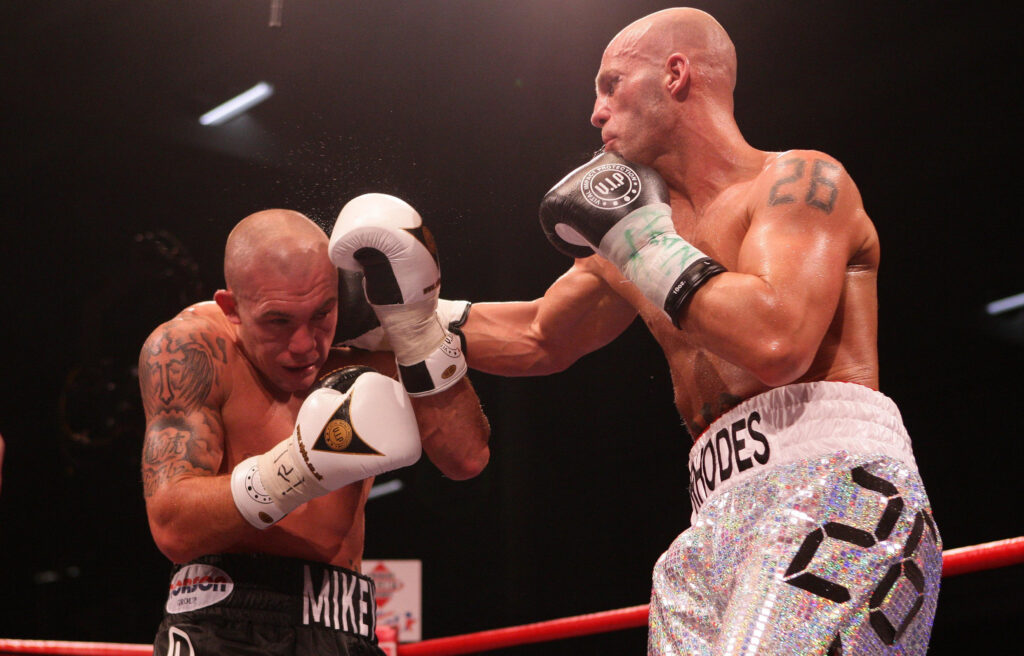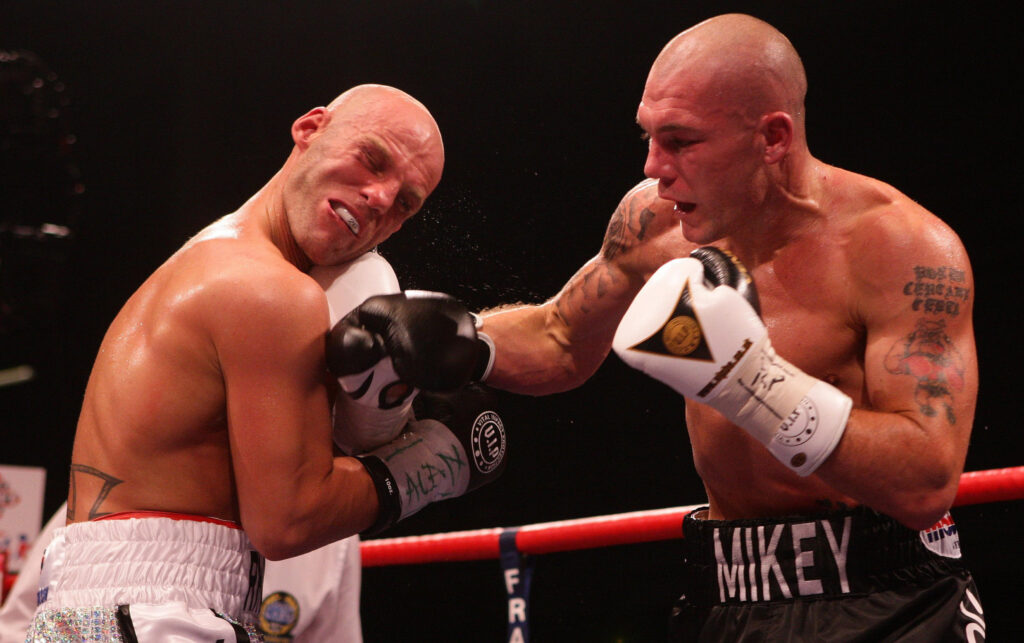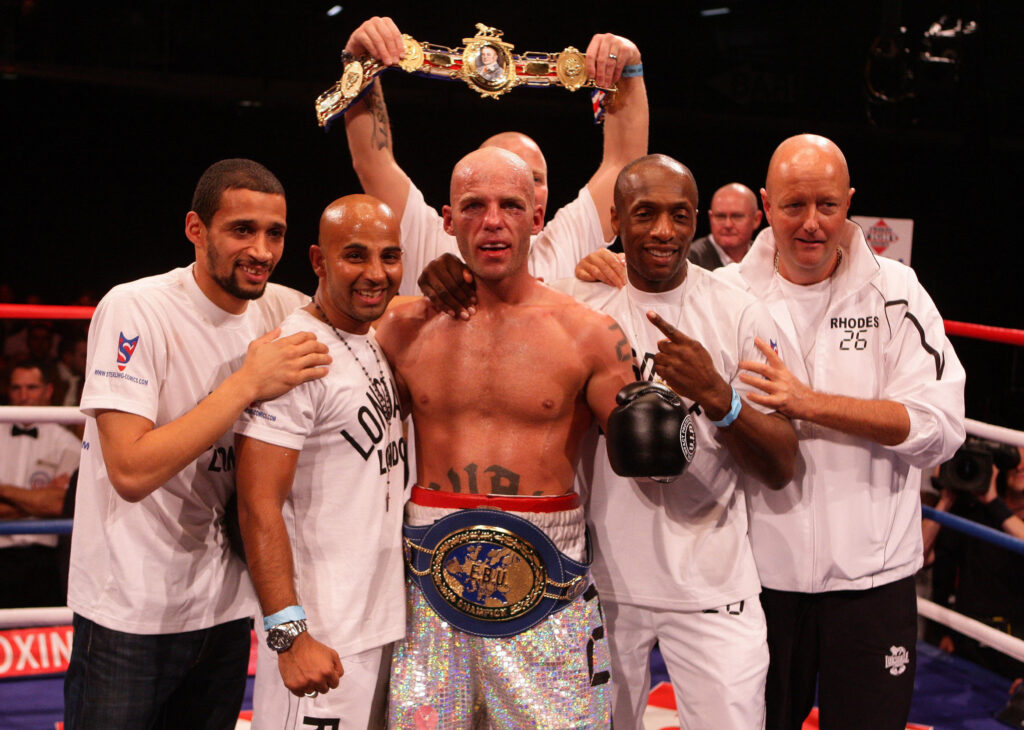On 23 October 2009, two boxers temporarily put their friendship aside. Jamie Moore entered the Bolton Arena ring the betting favourite and on the verge of a world title shot. The Mancunian was defending his European 154lbs crown, but much more was on the line. The reigning champion looked to have the perfect foil in Ryan Rhodes, a fighter with a significant name but seemingly chasing past glories.
The Sheffield man was on an impressive winning run of his own, but his road to redemption narrative was, in many ways, lost in translation. It all seemed to be about the Salford fighter as if victory would prove a formality, even if that win would be hard-earned. Rhodes was expected to put up a show before eventually breaking under the predicted onslaught.
But the Sheffield fighter had other ideas. Rhodes certainly didn’t see this as one final payday or even his own last chance of title glory.
“I was winning, I was doing well, I had peaked late as well. I’d had a long career, but not a hard one,” Rhodes told Boxing Social. “My style was hit and not get hit. Going into the Jamie Moore fight, I’d had a couple of great wins. I had won the British light-middleweight title in 2008, as well the WBC international title. So my career was flying, I was on a real high. I had never been beaten down at light-middleweight [at the time].”
Even the prospect of fighting someone who was seemingly headed to a world title fight didn’t worry Rhodes. “When we got offered the Moore fight I was really confident, really excited. I just knew I was going to win,” he said.

Photo: Dave Thompson/Press Association.
Rhodes was, at one point in his career, undefeated in 16 fights and the British 154lbs champion. An unexpected points defeat for the vacant WBO middleweight title against the clever Canadian Otis Grant in 1997 started a frustrating period in his career. Despite winning the majority of his fights in the aftermath of the Grant loss, further defeats to Jason Matthews, Lee Blundell and Gary Lockett at 160lbs seemed to indicate a downward trajectory in Rhodes’s career.
“Two of the losses were in world title fights and the loss to Lee Blundell there was a lot going on in my life at that time,” recalled Rhodes. “Promotion wise, management wise things weren’t going well. I was at the Ingle Gym for 22 years and, probably for the last few years, I had become a little stale. Fights weren’t happening, fights were falling through and I wasn’t getting the fights I had signed up to. I had got into a little bit of a rut and I couldn’t get out of it. A lot of people had left the gym, there were different faces and it just wasn’t the same.
“When I decided to leave and go with Dave Coldwell, I got the spark back, the buzz back again. It was different training, different atmosphere, I didn’t know what I was going to be doing when I went to the gym, it was a new experience and it brought the youth back in me and I really started enjoying boxing again. From there, I just went from strength to strength.”
Since the Grant fight, Rhodes had largely competed at middleweight, but a switch to his more natural fighting weight, coupled with his new environment resulted in an ‘Indian Summer’ in his boxing career.
“Obviously, I got some really good opportunities at middleweight, world title fights and you are not going to turn them down,” he said. “But I had matured more, disciplined myself, I knew my body more and I knew how my body worked, what foods worked and what foods didn’t work. I had become a lot more knowledgeable on my body and myself, so making light-middleweight again I made it comfortable. Light-middleweight was my best weight, I had so many good nights, I had opportunities at middleweight but it didn’t quite work out for me there.”
Moore was known for his come-forward style and the fighter perceived to be the fighter on the up, seemingly at his peak, maybe just one fight away from a crack at the world title. Rhodes, despite being confident of victory, was under no illusions about what the night promised.
“The tactics were to jab and move around for a bit, have a look at him, throw combinations, grab hold of him, move him around. I knew he would come straight at me,” recalled Rhodes. “Dave and I were at a local swimming baths sat in a jacuzzi and he said this is this one fight where you will just have to really dig in and give everything and find that something extra inside you.”
Once the first bell rang, Rhodes quickly had to adapt and remember just what Coldwell had said to him. “I went out with all the intentions of jabbing and moving, make him miss, counter him. But honestly, the pressure he had, I just couldn’t get out of the way how I wanted to, he was on me so fast,” he said. “I went back to the corner and we both looked at each other as if to say those three or four rounds are happening now. So, from round two, I just tucked up and took what he had, and he did the same.”
The way the fight had started seemed to indicate that Rhodes would indeed come off second best. After the second round, the in-fight odds had Moore 1/12 to win. But gradually, as the fight progressed, Rhodes looked as though he might turn it around after a difficult start.

Photo: Dave Thompson/Press Association.
“In round four, I finished the last 30 seconds of the round really strong. After each round, I was going back to my corner feeling more and more confident. I’d taken his best shots, he had not wobbled me or anything like that,” said Rhodes. “I could just feel Jamie slowing down and, at the end of the fourth, I said to Dave, ‘I think I have got him now’, I could take everything he was throwing and just walk through it.”
The fight was a savage toe-to-toe war from virtually the opening segments of the fight. The sixth, especially, is one to savour over and over, where there didn’t appear to be any visible signs of either man wilting. Moore came out for the pivotal seventh strongly and there still seemed plenty of fight left in both men at that stage.
“So he came out pressuring me and then he got me on the ropes, and I think I did a double roll, rolled left, rolled right and I hit him with a right hook and his legs just went from right underneath him,” remembered Rhodes. “Another conversation Dave and I had was that Jamie was at his most dangerous when he was hurt. So we knew even if we did hurt him, don’t just think you had got him, we knew not to waste energy and blow ourselves out.
“Then all of a sudden Jamie came on strong again with some big shots. But, again, I just felt confident in taking his shots and then I caught him again and he fell back on the ropes, and when I landed a few more combinations the referee jumped in and stopped it.”
Rhodes (46-6, 31 KOs) proved a lot of people wrong, not just by beating Moore, but in the manner of the victory. The obvious pain of the win could not dim what the fight meant to the new champion.
“The next day I was doing a Q & A [interview], I had agreed to do it like an idiot, and I was in so much pain,” he said. “I had also scratched my eye, so I had a patch on my eye, I had stitches in the other eye. I was black and blue all over, my ribs were aching. But you know what, it was such a feeling winning that European title when I had been written so much in that fight.
“A lot of people had thought that Jamie would just walk through me and, a few years prior, nobody thought I would do anything again. That fight got me to the No.1 [spot] in the WBC rankings and become the mandatory challenger to Canelo Alvarez.”
Throughout the conversation with Boxing Social, Rhodes was full of praise for his friend Moore and the former champion more than played his part in a classic encounter that took both men to the brink.
“I take my hat off to Jamie, he’s a credit to boxing, I mean how many fights of the year did he have?” said Rhodes. “He gave the fans value for money, and obviously our fight was another fight of the year, round of the year and we won some good awards from it.”
It was, in many ways, the finest performance of Rhodes’s long career. At 32, Rhodes was the forgotten man, his best days supposedly long behind him. Yet he defied his critics and abandoned the Ingle fundamentals in a fight that will live long in the memory.

late Dean Powell) celebrate the epic win over Moore.
Photo: Dave Thompson/Press Association.
Main image: Dave Thompson/Press Association.
